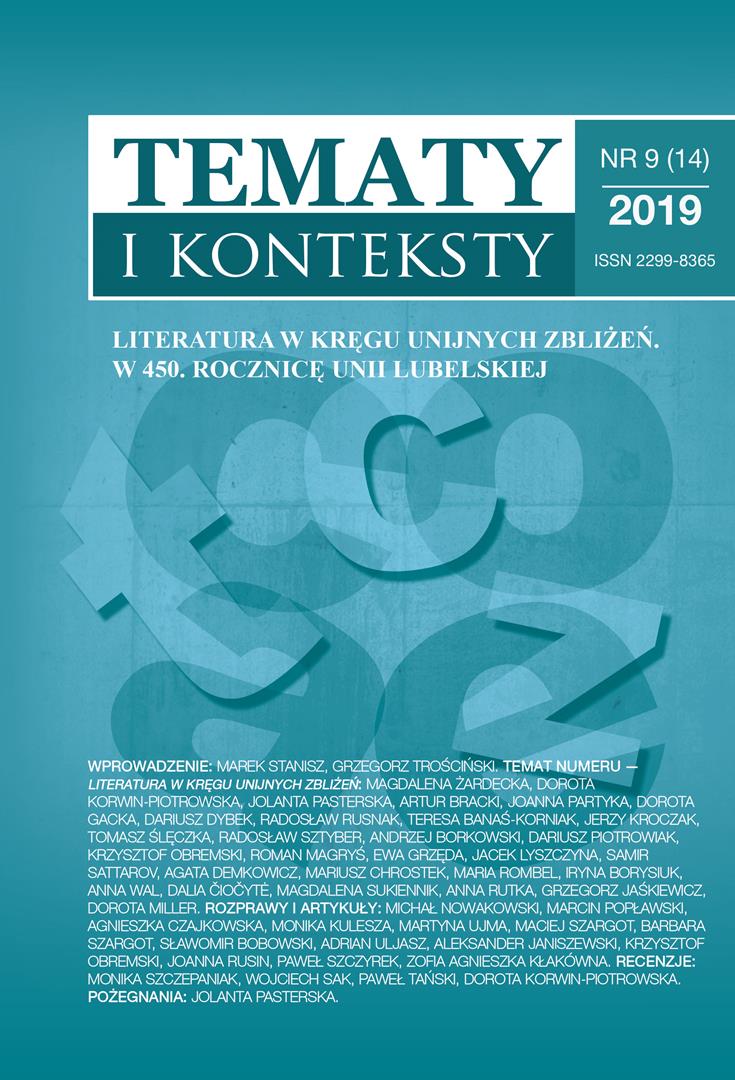Zdzisław Beksiński i ponowoczesna melancholia. Zarys interpretacyjny (Na końcu ogrodu, Centrala snów, Informator)
DOI:
https://doi.org/10.15584/tik.2019.43Słowa kluczowe:
melancholia, Zdzisław Beksiński, opowiadania, postmodernizm, sacrum, utopia społeczna, kryzys idei, dekonstrukcja, narracja, socjologia sztuki, przełom politycznyAbstrakt
The artistic output of Zdzisław Beksiński finds recognition all over the world. Not so long ago, his visual heritage was enriched by new, literary accomplishments – the collection of short stories written by the artist between 1963 and 1965. The present paper is an analysis of three most expressive pieces in terms of studied esthetics: Na końcu ogrodu, Centrala snów oraz Informator.
Beksiński’s short stories are here placed in the context of postmodern melancholy characterized by affirmation of experienced emptiness the source of which was sought for in Beksinski’s generational experiences. On these grounds, a thesis is proposed where the holistic creative concept which merges visual and literary accomplishments is expressed by three figures: decay, repetition and ontological uncertainty. Not only is the object of the analysisa theoretical aspect of a worldview present in the literary works but it also functions as a specific fictional-structural solution.
Downloads
Bibliografia
Adamski A., Artyści Podkarpacia, Rzeszów 2010.
Beksiński Z., Opowiadania, Olszanica 2015.
Beksiński Z., Dmochowski P., Beksiński – Dmochowski. Listy 1999–2003, Warszawa 2017.
Bieńczyk M., Melancholia. O tych, co nigdy nie odnajdą straty, Warszawa 2012.
Bieńczyk M., Oczy Durera. O melancholii romantycznej, Warszawa 2002.
Browarny W., Opowieści niedyskretne. Formy autorefleksyjne w prozie polskiej lat dziewięćdziesiątych, Wrocław 2002.
Grzebałkowska M., Beksińscy. Portret podwójny, Kraków 2014.
Kołakowski L., Odwet sacrum w kulturze świeckiej, w: Czy diabeł może być zbawiony i 27 innych kazań, „Aneks” 1982.
Nyczek T., Zdzisław Beksiński, Warszawa 1989.
Ochman W., Wstęp, w: Beksiński 2, Olszanica 2002.
Ochman W., Zdzisław Beksiński, Olszanica 2002.
Podraza-Kwiatkowska M., Bóg, ofiara, clown czy psychopata? (O roli artysty na przełomie XIX i XX wieku), w: tejże, Symbolizm i symbolika w poezji Młodej Polski, Kraków 1994.
Popiel M., Powieść o artyście jako gatunek literacki i jako rodzaj dyskursu, w: Z problemów prozy – powieść o artyście, red. W. Gutowski i E. Owczarz, Toruń 2006.
Rabizo-Birek M., Portrety artystów w „czasie marnym” w powieściach początku XXI wieku, w: Z problemów prozy. Powieść o artyście, red. W. Gutowski i E. Owczarz, Toruń 2006.
Skoczeń J. M., Beksiński. Dzień po dniu kończącego się życia, Warszawa 2016.
Skoczeń J. M., Detoks. Zbigniew Beksiński, Norman Leto: korespondencja, rozmowa, Warszawa 2018.
Skrobała C., Wszystko jest bez znaczenia. Rozmowa ze Zdzisławem Beksińskim, „Życie Literackie” 1987, nr 21.
Taranienko Z., Znaczenie jest dla mnie bez znaczenia, „Sztuka” 1979, nr 4/6.
Pobrania
Opublikowane
Jak cytować
Numer
Dział
Licencja
Prawa autorskie (c) 2019 Tematy i Konteksty

Utwór dostępny jest na licencji Creative Commons Uznanie autorstwa – Użycie niekomercyjne – Bez utworów zależnych 4.0 Międzynarodowe.




